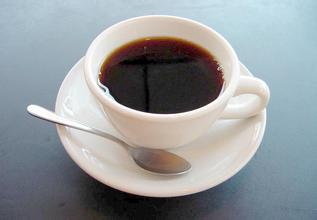Introduction to the characteristics of Kopi Luwak Flavor Manor of Fine Coffee beans in Bali, Indonesia
It is said that coffee farmers in early Indonesia regarded civet cats that ate ripe coffee fruits as mortal enemies, but at some point someone began to think of picking coffee beans from the civet droppings to make coffee with unique flavor. Coffee experts everywhere have tried and were amazed. Since then, local farmers spend a lot of time collecting civet droppings in the forest every day during the coffee ripening season.
After Indonesians remove the silver-gray film on the appearance of coffee beans, wash them with water, dry them in the sun, and stir-fry them, they become cat poop coffee beans.
Only about 150 grams of coffee beans can be extracted from a jin of civets' feces, which can cause 20% loss in the roasting process. Due to the unique raw materials and processing technology, this kind of coffee can be said to be very rare. No more than 400 kilograms of coffee beans are supplied worldwide each year.
Traditionally, coffee fruit is washed or sun-treated to remove excess parts and take out coffee beans, but Luwak obtains coffee beans by using its natural fermentation in civets, so it has a unique flavor.
Coffee beans generally go through the process of shell fermentation, coffee beans in the civets' intestines, special bacteria provide a unique fermentation environment, the flavor becomes unique, particularly thick and mellow. The coffee beans fermented by civets' intestines and stomach are very thick and mellow.
Eva, the owner of Special Cafe, is a coffee enthusiast who travels around the world every year in search of rare goods. She told reporters that the "Kopi Luwak" was once a tribute from Indonesia to the Dutch royal family. At that time, the industry regarded the coffee with the name "cat shit" as a joke, and people didn't get interested in the Kopi Luwak until it was specially reported in National Geographic magazine.
Folding is expensive
The Kopi Luwak Initiative is the least produced coffee in the world. A bag of 50 grams of coffee beans costs more than 800 yuan, and only 5 cups of coffee can be brewed. In other words, the price of a cup is about 200 yuan. The civet coffee gift box produced by Fireboat Group, Indonesia's largest coffee supplier, sells for 600,50g at Shangpin Cafe with extremely luxurious packaging, while the asking price for 100g is more than 2000 yuan, and the global annual output in the wild does not exceed 400kg. Today, villagers in these areas not only collect wild Rwaka feces, but also begin to raise Rwaka in captivity. Large pots of picked coffee cherries were placed in front of Rwaka, and the hungry Rwaka had no choice but to eat all the coffee cherries. The taste of Rwaka coffee produced in this way is naturally greatly reduced. "scarcity is precious", which has led to the high price of Kopi Luwak, a rare treasure. I'm afraid you'll have to prepare £50 for a cup of coffee, and you may not be able to find it everywhere.
A cup of coffee made from 12 grams of cat shit coffee powder sponsored by the Fireboat Group at the 2010 Shanghai World Expo costs 380 yuan, which is limited to 12 cups a day in short supply.
In Bali, a cup costs more than 200,000 rupiah, equivalent to more than 150 RMB.
In the United States, 1 kilogram of cat poop coffee beans is as high as USD 1200. It is always around USD 1000 in the international market.
In England, a cup costs 50 pounds (RMB 500).
"civets" are omnivores. They are withdrawn by nature and like to walk at night. They live in tropical rain forests, subtropical evergreen broad-leaved forests, mountain thickets or hills, mountains and grasses below 2000 meters above sea level. Its food includes small beasts, birds, amphibians and reptiles, crustaceans, fruits and seeds of insects and plants. The civet likes to choose the most mature, sweet, juicy coffee fruit in the coffee tree as food, while the coffee fruit passes through its digestive system and is digested only by the pulp on the outside of the fruit. The hard coffee beans are then excreted intact by the civets' digestive system. This is the "natural fermentation method" that was once scoffed by Americans. It is said that when Americans heard about this way of making coffee, it was regarded as a fantasy, and it was not until it was reported by National Geographic that they became interested in it.
This digestion process, so that coffee beans have an unparalleled magical change, the flavor tends to be unique, the taste is particularly mellow, rich and round sweet taste is also unmatched by other coffee beans. This is due to the fact that the civets' digestive system destroys the protein in the coffee beans, making the coffee much less bitter and increasing the round taste of the coffee beans. Experts say there is a gland near the sexual organs of the Indonesian "civet" that secretes milky oil, which has always been a precious raw material for the perfume industry. Even Shakespeare's play King Lear has this dialogue: "Please give me some civet oil to stimulate my inspiration." Others said, "this coffee is unique and is a specialty of Indonesia." Drink it, it's like finding a diamond in a stone. " Because the wild "civets" are obviously better at selecting good coffee fruits, so that this kind of coffee has outstanding characteristics.
Experts who have tasted this kind of coffee have gone to two extremes in their comments on its taste. One describes the coffee as "the best in the world". The taste is so unusual that it is difficult to describe in words and words: "with a bit of dirt, slightly choking and visceral taste, it won't go away in the mouth for a long time until the last drop." Another evaluation is quite the opposite: "it's hard to swallow, it's a complete gimmick, and it's not worth paying for stinky coffee." According to coffee experts, most of the Ruwak coffee is low-altitude robusta beans, which proves that civets prefer robusta to high-altitude Arabica beans. Generally speaking, Indonesian coffee has the taste of earth and traditional Chinese medicine, and its consistency is the highest in all continents, but Ruwak has a stronger taste and consistency, which is almost close to syrup, and its flavor is very special. if you don't like Indonesian coffee in the first place, you must hate Ruwak coffee even more. if you prefer the fishy smell of Indonesian aged beans or Indian-style beans, you may fall in love with Ruwak coffee with similar flavor.
To put forward the polarized evaluation, some people compare it to the best coffee in the world, which is quite thick and tastes unusual, it is difficult to describe, it is a little rustic, slightly choking and visceral, and it stays in the mouth for a long time until the last drop. Some people say that it is difficult to swallow, it is a complete gimmick, and it is not worth spending money on smelly coffee. However, some people are willing to pay $10 for a cup of Ruwak coffee. Montanas sold only 30 pounds last year, which shows that this kind of coffee is still in the fresh stage in the United States and is more popular in Japan.

Important Notice :
前街咖啡 FrontStreet Coffee has moved to new addredd:
FrontStreet Coffee Address: 315,Donghua East Road,GuangZhou
Tel:020 38364473
- Prev

Introduction to the characteristics of Kilimanjaro Coffee
As the country's main cash crop, coffee is produced in the Mohi district of Kilimanjaro, where frequent crustal movements and active volcanoes give fertile soil to the mountains, as well as strong texture and soft acidity. She shows a delicate fragrance, with aromas of wine and fruit, and the aftertaste is amazing. The country's
- Next

Introduction to the characteristics of Costa Rican Yerzaro Coffee Flavor Manor
Excellent Costa Rican coffee is called extra hard beans, and this kind of coffee can grow at an altitude of more than 1500 meters. Altitude has always been a problem for coffee growers. The higher the altitude, the better the coffee beans, not only because the higher altitude can increase the acidity of the coffee beans and thus increase the flavor, but also because the night temperature at the higher altitude is lower, which can make the trees grow slowly.
Related
- Detailed explanation of Jadeite planting Land in Panamanian Jadeite Manor introduction to the grading system of Jadeite competitive bidding, Red bid, Green bid and Rose Summer
- Story of Coffee planting in Brenka region of Costa Rica Stonehenge Manor anaerobic heavy honey treatment of flavor mouth
- What's on the barrel of Blue Mountain Coffee beans?
- Can American coffee also pull flowers? How to use hot American style to pull out a good-looking pattern?
- Can you make a cold extract with coffee beans? What is the right proportion for cold-extracted coffee formula?
- Indonesian PWN Gold Mandrine Coffee Origin Features Flavor How to Chong? Mandolin coffee is American.
- A brief introduction to the flavor characteristics of Brazilian yellow bourbon coffee beans
- What is the effect of different water quality on the flavor of cold-extracted coffee? What kind of water is best for brewing coffee?
- Why do you think of Rose Summer whenever you mention Panamanian coffee?
- Introduction to the characteristics of authentic blue mountain coffee bean producing areas? What is the CIB Coffee Authority in Jamaica?

